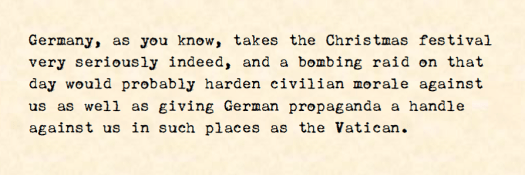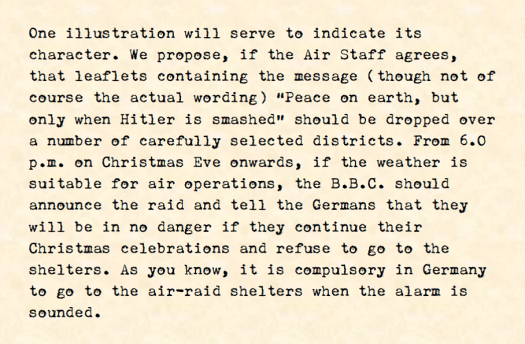“Peace on earth, but only when Hitler is smashed”: Christmas wartime propaganda
Document of the month: FO 898/311/330-1
Guy Woodward on propaganda and the festive season
Supposedly a time of peace and goodwill, for the wartime propagandists Christmas was a time to exploit fears and encourage enemy divisions. A memorandum in the PWE archive, written in the run up to Christmas 1940, suggests that the festive season is a time when German civilians and troops ‘will feel the absence of their families more strongly and will be most susceptible for this reason to certain lines of propaganda, particularly if that propaganda is made to appear as though it were not propaganda at all.’

The writer is the future Labour cabinet minister Richard Crossman, then head of Ministry of Economic Warfare’s German section. He is writing to Rex Leeper, Head of SO1, the propaganda division of the Special Operations Executive and the immediate predecessor of the PWE; the document is one of a series in file FO 898/311, ‘Projects And Targets. Reports And Bulletins. Background Notes’ outlining plans for ‘Christmas Propaganda’.
Crossman writes that his team have developed a plan combining open and secret broadcasting with leaflet drops in the hope of ‘for exploiting Christmas Eve in order to demoralise German civilians and the German Armies of Occupation.’ He reports that the Air Ministry are refusing to cooperate, however, and have insisted that if a raid does take place on Christmas Eve, bombs rather than leaflets will be dropped. Crossman’s department are very concerned by this:

Crossman outlines his alternative plan, which he argues ‘will have a more potent effect than any air-raid’:

In this way Crossman hoped to foment discord between German officials insisting on a retreat to the shelters, and civilians wishing to continue with their Christmas celebrations. He believed this would ‘maximise friction between the people and the [Nazi] Party, and lay the onus for the disturbance of the Christmas festivities not upon us, but upon the Party machine.’ This was a manoeuvre often deployed by the PWE later in the war: many covert propaganda campaigns were designed to arouse resentment for officialdom by suggesting this was characterised by cruelty, corruption or incompetency. It is striking how the plan also seeks to exploit a perception that the BBC is more trustworthy than the German authorities.
The hostility of the Air Ministry to this sort of thing was characteristic: the RAF were notably sceptical about the value of dropping propaganda leaflets from the air and often reluctant to facilitate drops over enemy territory, thinking these wasteful and dangerous for aircrews.[1] The flavour of this hostility can be gauged from an acidic Air Ministry letter dated 26 November 1940 also found in this file, which observes that:

Crossman’s memo concludes with a request for Leeper to come down to ‘The Country’ (SO1’s base at Woburn Abbey, Bedfordshire) to discuss matters further. It seems unlikely that the leaflet raid (which Crossman anticipated would require ten aircraft) ever took place, but in the end the Air Ministry’s plans were also frustrated: in 1940 an unofficial two-day Christmas truce in the aerial war between Britain and Germany prevailed.
Notes
All archival material is Crown Copyright and is held in The National Archives. Quotations which appear here have been transcribed by members of the project team.
[1] See Tim Brooks, British Propaganda to France, 1940-1944: Machinery, Method and Message, (Edinburgh University Press, 2007), p. 37 and David Garnett, The Secret History of PWE: The Political Warfare Executive 1939-1945, (London: St Ermin’s Press, 2002), p. 188.
